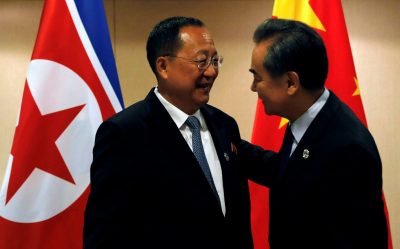Potential conflict stemming from a North Korean crisis is dealt with in generally vague ways.
Chinese editorials celebrating the country’s centrality to the latest round of sanctions on North Korea remind domestic readers that China is carrying forward its responsibilities as ‘a great power’.
This kind of work also leads to editorials about China’s ‘bottom line’ on the Korean peninsula, which includes, if not a Kim-led North Korea, a North Korea that remains sovereign and does not become ‘opposed to China’.
The Chinese media has drifted away from the kind of rhetorical savaging that the North Koreans practice on ‘the American imperialist wolves’. But the rhetoric of national humiliation still has its purposes. Editorial discussions of US naval patrols in the South China Sea are given bombastic titles like ‘This is not 1937, and the South China Sea is not the Marco Polo Bridge’, explicitly likening the United States to the Japanese aggressors of yore. Not incidentally, Mao and Zhou Enlai did precisely the same thing in the early 1950s, posing US moves on the Korean peninsula as a reprise of Japan’s 1894 action to humiliate China and strip Taiwan from the mainland’s inexorable orbit.
China’s recollections of the war can become, to abuse a Maoist term, protracted.
That is, Chinese war memory credibly has the ability to stretch into the stationing of troops in North Korea until 1958, a period that was accompanied by the reconstruction of that country’s infrastructure via Chinese labour. A great deal of data on China’s reconstruction of North Korean rail and road networks in that period is now available, a neat convergence of socialist internationalist nostalgia with the government’s current zeal for cross-border transportation chains.
As a result of the military presence in North Korea through most of the 1950s, China’s intelligence on North Korea’s tunnel network is second to none. Many of the underground chasms that now hold the Korean People’s Army artillery and untold nuclear hardware were either deepened or dug by the Chinese in the first place.
China holds all sorts of keys, including economic ones. It is not simply an overwhelming trade balance, but knowledge of the North Korean economy.
As Andray Abrahamian said in a Tokyo seminar on 5 July 2017:
‘China also has, by far, the best information on what is going on in the North Korean economy, better, I suspect, than the North Koreans have themselves. They have thousands of people running businesses — the huaqiao, or ethnic Chinese — who go back and forth all the time. They have consulates or offices in several cities in a way that no other country has, and they have a huge embassy in Pyongyang. So they really, really know what’s going on. I think that they will be able to smell a crisis far earlier than anyone else and will be able to take steps to make sure it doesn’t turn into a full-blown collapse’.
But China’s assumed predominant and potential power in the event of a North Korea crisis is only ever raised obliquely, such as in the case of People’s Liberation Army military drills in Jilin province like those in March 2017, or in fulsome public recollections of the ‘War to Resist America and Aid Korea’.
China’s Foreign Ministry today calls for ‘double suspension’, namely, a suspension of North Korean nuclear missile and nuclear tests paired with a US and South Korean suspension of annual joint military exercises. As the US State Department pointed out, this Chinese suggestion rests upon the fallacy of moral equivalency — namely, while the US–South Korea exercises are legal and transparent, the North Korean tests are internationally illegal.
So why go along with it, much less the Chinese suggestion that the United States starts a parallel process of peace talks for a treaty with North Korea, outside of the diseased and disused but still present frame of the Six-Party Talks?
One can sympathise with China’s need to simply do something, particularly the desire for that ‘something’ to be a series of actions that do not ask anything whatsoever of the Chinese Communist Party (CCP). In that sense, it is simply a retort to the US insistence to turn the screws ever tighter on North Korea. Moreover, calling for ‘dual-suspension’ or denouncing the ‘China responsibility theory’ distances the need to dig deeper into the unpleasant marrow of what the United States actually appears to want. This is a full economic blockade on North Korea and, depending on the day and the politician, either the trial of its leaders for crimes against humanity or for China to open its doors to a new wave of wealthy and complicit North Korean elites in exile, including the Kim family.
The CCP’s purge of Sun Zhengcai, replete with warnings to officials in Jilin — the northeastern border province that he managed during the fattest years of Chinese sunshine toward North Korea — would appear to indicate that the CCP will remain in a holding pattern in its foreign policy toward North Korea for the time being. In the meantime, the presses must thunder anew each day, and China must be seen by its own citizens to be a proactive power whose shortcomings on the North Korea issue can be explained away by pointing fingers outward — less often at the familiar crevasses and tunnels of Pyongyang, but at the loose lips and swivelling thumbs of one Donald Trump.
Adam Cathcart is a Lecturer in Chinese history at Leeds University.

